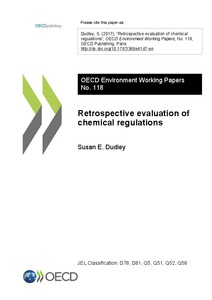Retrospective evaluation of chemical regulations
"OECD countries rely on regulatory tools to manage potential risks from exposure to targeted chemicals. Ex-ante regulatory impact assessment has a long tradition in many OECD countries, with established analytical steps and oversight as well as opportunities for public engagement to hold govern...
| Main Author: | |
|---|---|
| Institution: | ETUI-European Trade Union Institute |
| Format: | TEXT |
| Language: | English |
| Published: |
Paris
2017
OECD |
| Subjects: | |
| Online Access: | https://www.labourline.org/KENTIKA-19287392124910055749-Retrospective-evaluation-of-ch.htm |
| Summary: | "OECD countries rely on regulatory tools to manage potential risks from exposure to targeted chemicals. Ex-ante regulatory impact assessment has a long tradition in many OECD countries, with established analytical steps and oversight as well as opportunities for public engagement to hold governments accountable for conducting analysis before regulations are issued. But ex-ante analyses necessarily depend on unverifiable assumptions and models of how the world would look absent the regulation, and how responses to regulatory requirements will alter those conditions. In essence, ex-ante analyses are hypotheses of the effects of regulatory actions.
Better ex-post regulatory evaluation would allow agencies and others to test those hypotheses against actual outcomes. This would not only inform decisions related to the cost-effectiveness of existing policy, but would provide feedback that would improve future ex-ante analyses and future policies. However, ex-post analysis also poses challenges, especially when it comes to chemical risks. Once a regulation is in place, it is not always obvious what the world would have looked like without it. Measuring opportunity costs is not easy, and measuring regulatory benefits is often harder. Furthermore, once a regulation is in place, neither regulators nor regulatory entities have strong incentives for examining its actual impact.
As a result of these methodological and incentive challenges, while ex-post evaluation has a long tradition in other areas (particularly in programmes financed through the fiscal budget), it has received little attention (and even fewer resources) in the regulatory arena, despite government guidelines requiring it.
This paper attempts to address these challenges to evaluating regulatory outcomes and learning from those evaluations. Drawing on experience in OECD countries, it reviews the practices used to understand the likely impacts of regulations aimed at reducing chemical risks both before and after they are issued. It examines why efforts at retrospective review have lagged behind prospective regulatory analysis, and offers recommendations for addressing methodological and incentive challenges to better evaluation." |
|---|---|
| Physical Description: | 33 p. Digital |

